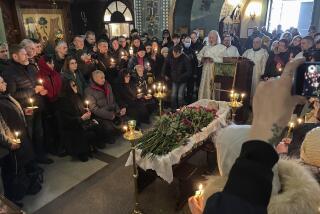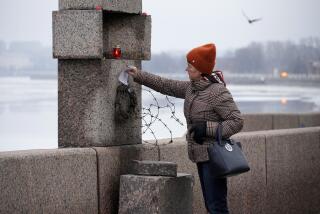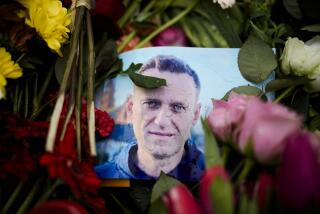Milosevic’s Family Wages Political Fight Over Burial
- Share via
VIENNA — With questions lingering about the cause of his death, the family of former Yugoslav President Slobodan Milosevic and his supporters waged a highly political battle Monday to force the Serbian government to allow them to return his body to his homeland for burial.
However, it remained unresolved whether the funeral and interment would be in Belgrade, the capital of the former Yugoslavia.
Milosevic, 64, who suffered from a heart condition and high blood pressure, was found dead Saturday morning in his cell at a U.N. detention center near The Hague. He had been on trial before the International Tribunal for the Former Yugoslavia on charges of genocide and other war crimes. Preliminary tests indicated he died of a heart attack.
Beyond family wishes, the squabble over Milosevic’s funeral centered on the political minefield of whether he would be accorded the public rites of a respected former president, or be buried privately as a deposed leader rejected by the majority in his country.
Under his leadership, the former Yugoslavia suffered through nearly 10 years of war that killed more than 225,000 people, destroyed tens of thousands of homes and farms and made nearly 2 million people refugees.
“His funeral and everything that happens around that will really be a barometer: Has Serbia learned its lesson?” said Zlatko Lagumdzija, the Muslim former prime minister and foreign minister of Bosnia-Herzegovina.
Milosevic’s son Marko, speaking to Russian television in Moscow, said, “He was the head of Serbia, the head of Yugoslavia. There is nothing to discuss. His place is in the Yugoslav capital.”
Reports that toxicology tests two weeks ago found a medication in Milosevic’s blood that could reduce the positive effects of heart medicine taken by the former Serbian leader fueled conspiracy theories and heightened fear that nationalists would consider the former leader a martyr.
The drug, Rifampicin, is an antibiotic generally used to treat tuberculosis and leprosy. It causes the body to process beta blockers more quickly, leaving the heart potentially more vulnerable in the event of a heart attack, said Dr. Ravi Dave, a cardiologist and associate professor at UCLA.
But Dave and other medical experts questioned whether Rifampicin could have had a role in Milosevic’s death.
“I think he had a heart attack because he was going to have a heart attack because of cholesterol buildup in his heart,” Dave said.
Dr. Prediman K. Shah, director of cardiology at Cedars-Sinai Medical Center, said, “Beta blockers are not a panacea. They only reduce one-quarter of the risk” of heart attacks or death from heart attacks. Risk conditions, such as diabetes, smoking or depression, that are not addressed could continue to contribute to the heart attack risk.
The presence of an unprescribed drug in Milosevic’s blood, however, raised questions about security at the U.N. detention facility.
It was unclear where Milosevic may have obtained the drug. Russian pathologists were on their way to The Hague to review the autopsy results, but Dutch authorities apparently ruled out foul play and released the body to his family Monday afternoon.
Groningen University toxicologist Donald Uges, who Monday discussed an analysis of the earlier blood test, theorized that Milosevic could have taken the drug to make himself more ill so the war crimes court would allow him to seek treatment in Moscow, where several members of his family live.
“I don’t think he took his medicines for suicide -- only for his trip to Moscow.... That is where his friends and family are. I think that was his last possibility to escape The Hague,” Uges said in interviews with news services. “I am so sure there is no murder.”
Uges said tests he had conducted two weeks ago on Milosevic’s blood showed traces of Rifampicin. Milosevic told his lawyer as recently as Friday that he believed that he was being poisoned, citing the Rifampicin. He sent a letter to the Russian Embassy in The Hague asking for help.
The text of the handwritten letter, dated March 8, was released late Monday by Milosevic family representative Zdenko Tomanovic, an attorney. “I think that the persistence with which the medical treatment in Russia was denied, in the first place is motivated by the fear that through careful examination it would be discovered that there were active, willful steps taken to destroy my health throughout the proceedings of the trial, which could not be hidden from Russian specialists,” it said.
Russian authorities expressed disappointment that The Hague tribunal turned down Milosevic’s request to be sent to Russia for treatment. The official news agency Itar-Tass said that Russian Foreign Minister Sergei V. Lavrov recalled that Russia had been prepared to “host Milosevic for medical treatment and provide 100% guarantees he will return to The Hague afterward.”
“We cannot help but be troubled that shortly after this Milosevic died,” Lavrov said. “In a situation when we were not believed, we too have the right not to believe, not to trust in the way this [forensic] examination is conducted.”
Meanwhile in Belgrade, Milosevic’s party, supporters and relatives pressed unsuccessfully for his burial in the “Alley of Heroes” in the city’s cemetery. The mayor, who is responsible for such a decision, denied the request.
Complicating matters, a Serb court ruled against suspending an arrest warrant for Milosevic’s widow, Mirjana Markovic, who is wanted in connection with murder and corruption allegations. However, that ruling is to be reconsidered today.
Marko Milosevic said he had made a provisional request to Russian officials to have his father buried in Moscow, “at least temporarily, until the proper conditions are available in Serbia to transfer him and to do everything as it should be done.”
Rubin reported from Vienna and Chong from Los Angeles. Times staff writer David Holley in Moscow contributed to this report.
More to Read
Sign up for Essential California
The most important California stories and recommendations in your inbox every morning.
You may occasionally receive promotional content from the Los Angeles Times.













